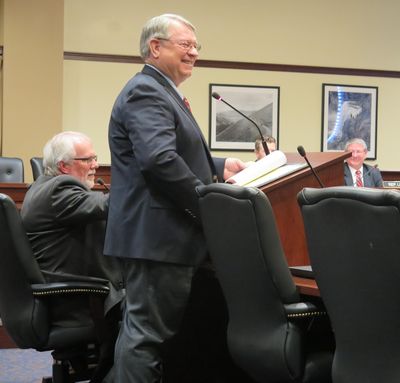Campaign finance reform bill introduced, over two North Idaho reps’ objections

Candidates and political action committees would have to report more detailed information more often about their campaign contributions under legislation introduced in the Idaho Legislature on Tuesday.
The reform bill was unanimously endorsed by a bipartisan interim working group that held hearings over the summer, but two North Idaho lawmakers objected to it Tuesday.
It was presented to the House State Affairs Committee by Republican Idaho Secretary of State Lawerence Denney. Reps. Heather Scott, R-Blanchard, and Priscilla Giddings, R-White Bird, voted against introducing the bill.
The committee’s vote clears the way for a full hearing on the measure.
“What we’re trying to get at here is the dark money that comes in,” Denney said.
Giddings told Denney she was “taken aback” by reading the terms “dark money” and “grey money” in the bill’s statement of purpose, “Because nowhere in these 29 pages have I seen those words. I almost feel like it’s implying something about our current elected officials and our current process,” she said.
Denney responded, “Dark money is that money that is coming in from outside that there’s no reporting.”
Under the bill, he said, “If over $1,000 comes in from out of state, then you as a political candidate or committee cannot accept that unless that organization is registered in the state. It has no inference to candidates or elected officials. It’s just where that money is coming from.”
The bill is aimed at allowing the public to identify sources of contributions, Denney said.
“Grey money is that money that’s transferred from PAC to PAC to PAC and you really have to know how to navigate to determine where that money came from,” he said, “and sometimes we get to the point where that grey money came from dark money to start with, and then it was transferred from several PACs.”
Giddings questioned whether including social media in the definition of electioneering might violate free speech guarantees, and asked if Denney had consulted the Idaho Attorney General’s office. Denney said that office provided the definition of social media that was included in the bill.
The bill updates Idaho’s Sunshine Law, which was first enacted by voter initiative in 1974. Among the changes:
- Extending reporting requirements to all elections, including at the local or school district level and including recall elections, once a candidate has raised or spent more than $500.
- Requiring monthly campaign finance reports year-round if there’s any activity to report, up from the current requirement for filing only on certain dates before and after elections.
- Prohibiting political action committees from receiving more than $1,000 from another entity that hasn’t also registered and disclosed its funders, whether in-state or out-of-state; and requiring all committees engaged in campaigning in Idaho to disclose their leadership and main funders.
- Increasing fines for violations from the current $250 to up to $25,000.
- Including the internet and social media in the definition of “electioneering communications” that trigger reporting requirements.
- Posting all the new reports on a single, searchable database to be operated by the Idaho Secretary of State’s office. The office has requested $1.2 million in its budget next year to upgrade its systems to accommodate that.
Members of the House committee had lots and lots of questions about the bill – stretching on for more than an hour – before they agreed to introduce it.
Many of the questions that panel members asked Denney and Chief Deputy Secretary of State Tim Hurst focused on provisions in the bill that already are in state law. Others expressed confusion over how often they, as candidates, would have to file reports.
“It is a large bill – I don’t think most of them understood the way it is drafted,” Denney said after the vote. That includes several sections of current law being repealed and rewritten, he noted.
“It would certainly be nice if we could simply write the Sunshine Law to say what we really want to say: If you’re spending money to influence the outcome of elections, it needs to be reported,” he said. “But the devil is in the details.”
The changes in the bill wouldn’t take effect until July 1, 2019.
After the vote, committee Chairman Tom Loertscher, R-Iona, who served on the interim panel that recommended the bill, said, “You can see what a difficult deal this was during the work group in the interim. It wasn’t easy.”